-
 Bitcoin
Bitcoin $82,571.1119
0.41% -
 Ethereum
Ethereum $1,818.5574
0.17% -
 Tether USDt
Tether USDt $0.9997
0.00% -
 XRP
XRP $2.1527
1.56% -
 BNB
BNB $604.1119
0.15% -
 Solana
Solana $125.9743
1.03% -
 USDC
USDC $1.0000
-0.01% -
 Dogecoin
Dogecoin $0.1701
1.19% -
 Cardano
Cardano $0.6702
0.27% -
 TRON
TRON $0.2314
-1.04% -
 Toncoin
Toncoin $3.9236
5.34% -
 Chainlink
Chainlink $13.6408
1.24% -
 UNUS SED LEO
UNUS SED LEO $9.6189
0.15% -
 Stellar
Stellar $0.2688
1.41% -
 Avalanche
Avalanche $19.2365
-2.52% -
 Sui
Sui $2.3698
4.51% -
 Shiba Inu
Shiba Inu $0.0...01262
0.46% -
 Hedera
Hedera $0.1707
0.42% -
 Litecoin
Litecoin $86.4273
1.48% -
 Polkadot
Polkadot $4.0923
1.33% -
 MANTRA
MANTRA $6.2880
0.45% -
 Bitcoin Cash
Bitcoin Cash $302.9531
0.71% -
 Bitget Token
Bitget Token $4.5717
-0.70% -
 Dai
Dai $1.0000
0.00% -
 Ethena USDe
Ethena USDe $0.9999
0.03% -
 Pi
Pi $0.7720
-3.83% -
 Hyperliquid
Hyperliquid $12.6366
-0.35% -
 Monero
Monero $217.3520
1.57% -
 Uniswap
Uniswap $5.9717
1.03% -
 Aptos
Aptos $5.3569
3.52%
How does zero-knowledge proof (ZKP) improve privacy in blockchain?
ZKPs enhance blockchain privacy by allowing users to prove transaction validity without revealing sensitive data, though they add computational overhead.
Mar 27, 2025 at 10:35 am
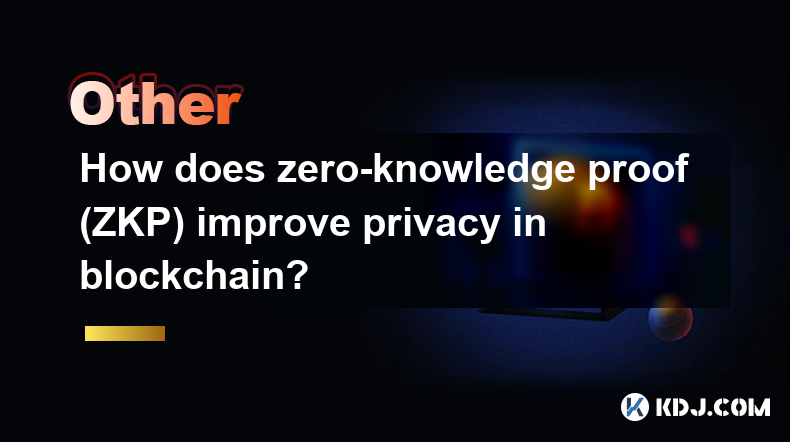
Enhancing Blockchain Privacy with Zero-Knowledge Proofs
Zero-knowledge proofs (ZKPs) are cryptographic techniques allowing one party (the prover) to prove to another party (the verifier) that a statement is true, without revealing any information beyond the truth of the statement itself. This is crucial for enhancing privacy in blockchain systems, which are inherently transparent. Traditional blockchains record all transactions publicly, compromising user privacy. ZKPs offer a solution by allowing users to prove the validity of transactions without exposing sensitive details.
Understanding the Mechanics of ZKPs
The core principle behind ZKPs lies in the ability to verify the validity of a claim without revealing the underlying data. Imagine proving you know the solution to a complex puzzle without actually showing the solution. This is analogous to how ZKPs work. A user can prove they possess sufficient funds to make a transaction without revealing the exact amount or the source of their funds. This is achieved through complex mathematical functions and cryptographic protocols.
Types of Zero-Knowledge Proofs
Several types of ZKPs exist, each with its strengths and weaknesses. zk-SNARKs (Zero-Knowledge Succinct Non-Interactive Arguments of Knowledge) are known for their efficiency and succinctness, making them suitable for high-throughput applications. zk-STARKs (Zero-Knowledge Scalable Transparent Arguments of Knowledge) are attractive for their transparency, as they don't require a trusted setup, unlike zk-SNARKs. The choice of ZKP implementation depends on the specific requirements of the blockchain system.
Implementing ZKPs in Blockchain
Integrating ZKPs into a blockchain requires careful consideration of several factors. The complexity of ZKP generation and verification can impact transaction speeds and network performance. The size of the proofs themselves can also influence storage requirements. Developers must balance privacy enhancements with the need for efficient and scalable blockchain operation.
- Transaction Privacy: ZKPs can conceal transaction amounts and participant identities, shielding sensitive financial information from public view.
- Identity Management: ZKPs can enable anonymous authentication and authorization, allowing users to prove their identity without revealing personal details.
- Data Integrity: ZKPs can verify the integrity of data stored on the blockchain without revealing the data itself. This is particularly useful for sensitive data like medical records or personal information.
- Compliance: ZKPs can facilitate compliance with privacy regulations by allowing users to prove compliance without disclosing sensitive data.
ZKPs and Privacy Coins
Privacy-focused cryptocurrencies like Zcash and Monero have already incorporated ZKPs to enhance transaction privacy. These coins use ZKPs to mask transaction details, making it difficult to trace the flow of funds. This significantly improves user privacy compared to transparent cryptocurrencies like Bitcoin. The implementation varies between projects, often requiring specialized wallets and software.
Challenges and Limitations
While ZKPs offer significant advantages for blockchain privacy, they also present certain challenges. The computational overhead associated with generating and verifying ZKPs can be substantial. This can impact transaction speeds and require specialized hardware. Furthermore, the complexity of ZKP implementations can make them difficult to audit and secure against potential vulnerabilities.
Future of ZKPs in Blockchain
The development and adoption of ZKPs are rapidly evolving. Researchers are actively exploring new and improved ZKP protocols that are more efficient, scalable, and secure. The future likely holds more widespread adoption of ZKPs across various blockchain applications, leading to enhanced privacy and security. This will enable the creation of more private and secure decentralized applications (dApps).
Scalability Considerations
Scaling ZKP implementations to handle a large number of transactions remains a significant challenge. The computational cost of generating and verifying ZKPs can limit the throughput of the blockchain. Researchers are actively working on developing more efficient ZKP protocols and optimizing existing implementations to address this issue.
Security and Auditing
The security of ZKP implementations is crucial. Any vulnerabilities in the underlying cryptographic algorithms or implementation could compromise the privacy of users. Rigorous security audits and independent verification are essential to ensure the robustness and trustworthiness of ZKP-based blockchain systems.
Common Questions and Answers
Q: Are ZKPs completely anonymous?
A: No, ZKPs don't guarantee complete anonymity. While they hide transaction details, they don't necessarily hide the fact that a transaction occurred. Sophisticated analysis might still reveal patterns or relationships.
Q: How do ZKPs differ from other privacy-enhancing techniques?
A: ZKPs offer a unique approach by proving the validity of a statement without revealing the underlying data, unlike techniques like mixing or ring signatures, which might still leak some information.
Q: Are ZKPs suitable for all blockchain applications?
A: Not necessarily. The computational overhead and complexity of ZKPs might make them unsuitable for applications requiring extremely high transaction speeds.
Q: What are the risks associated with using ZKPs?
A: The main risks involve potential vulnerabilities in the ZKP implementation itself, leading to privacy breaches. Incorrect implementation or flawed algorithms could compromise the security of the system.
Q: How can I learn more about ZKPs?
A: Start with research papers on the topic, explore open-source ZKP implementations, and follow the developments in the cryptocurrency community. Numerous online resources, including academic papers and blog posts, are available.
Disclaimer:info@kdj.com
The information provided is not trading advice. kdj.com does not assume any responsibility for any investments made based on the information provided in this article. Cryptocurrencies are highly volatile and it is highly recommended that you invest with caution after thorough research!
If you believe that the content used on this website infringes your copyright, please contact us immediately (info@kdj.com) and we will delete it promptly.
- This Year, the Pi Network Price Has Been in a Strong Downward Trend
- 2025-03-31 03:30:13
- HBAR Price Prediction: We Asked AI to Predict Hedera (HBAR) Price in April
- 2025-03-31 03:30:13
- Despite Winning the Court Battle, XRP Is Losing Ground
- 2025-03-31 03:25:12
- Dogecoin (DOGE) Markets Are Once Again Experiencing Significant Volatility, with Bitcoin (BTC) Recently Trading Below $80,000
- 2025-03-31 03:25:12
- If Dogecoin (DOGE) Hits $5, Shiba Inu (SHIB) Could Eliminate a Zero From Its Price
- 2025-03-31 03:20:13
- PepeX (PEPEX) Presale Accelerates, Stellar (XLM) Price Teeters on the Edge of a Significant Shift
- 2025-03-31 03:20:13
Related knowledge
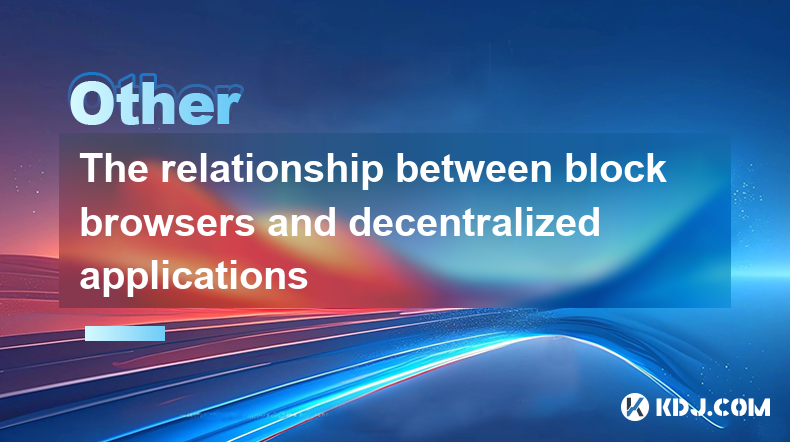
The relationship between block browsers and decentralized applications
Mar 30,2025 at 07:35pm
Understanding the InterplayBlock browsers and decentralized applications (dApps) share a symbiotic relationship within the cryptocurrency ecosystem. Block browsers act as crucial tools for interacting with and monitoring the blockchain, while dApps leverage this underlying blockchain infrastructure to provide their functionality. This interplay is esse...
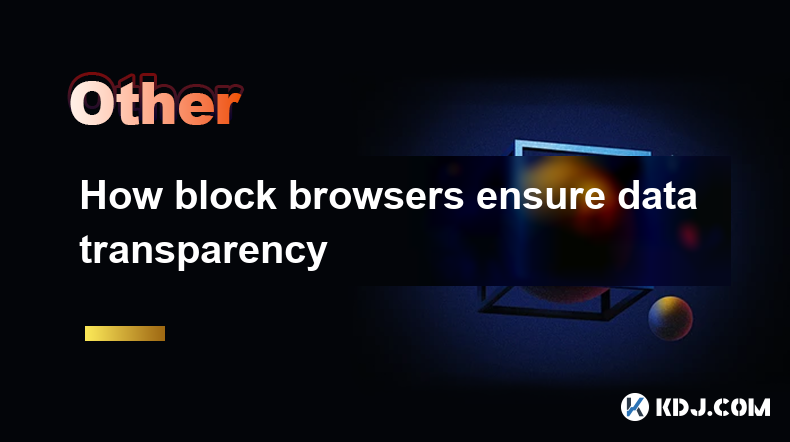
How block browsers ensure data transparency
Mar 30,2025 at 06:49am
Block browsers are designed to provide a transparent view into the inner workings of blockchain networks. Unlike traditional browsers that primarily access centralized servers, block browsers interact directly with the decentralized ledger, offering users a window into the immutable record of transactions. This transparency is a cornerstone of blockcha...
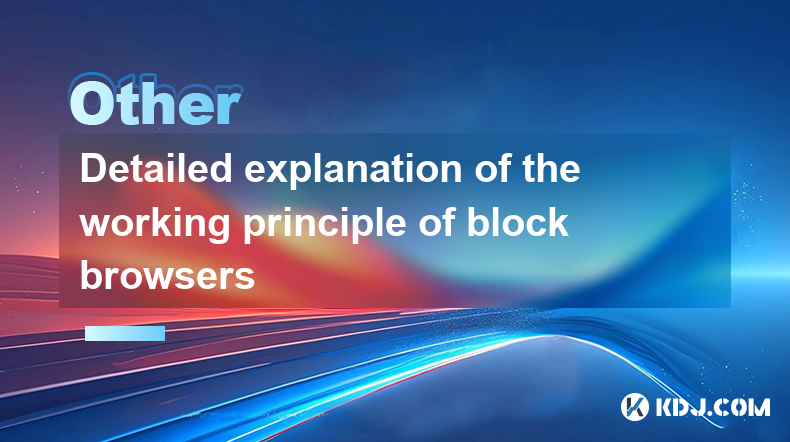
Detailed explanation of the working principle of block browsers
Mar 30,2025 at 03:00pm
Understanding Block Explorer FunctionalityBlock explorers are essential tools within the cryptocurrency ecosystem. They provide a user-friendly interface to view and interact with the underlying blockchain data. This data includes transaction details, block information, and the overall state of the network. Think of them as search engines specifically ...
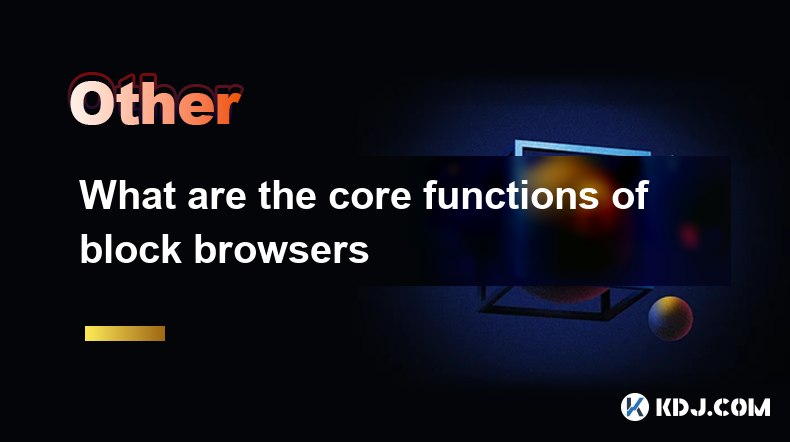
What are the core functions of block browsers
Mar 30,2025 at 02:50am
? Block explorers, also known as blockchain explorers, are crucial tools for anyone interacting with a cryptocurrency network. They provide a window into the inner workings of the blockchain, offering a wealth of information otherwise inaccessible. Understanding their core functions is key to navigating the cryptocurrency landscape effectively. Explorin...
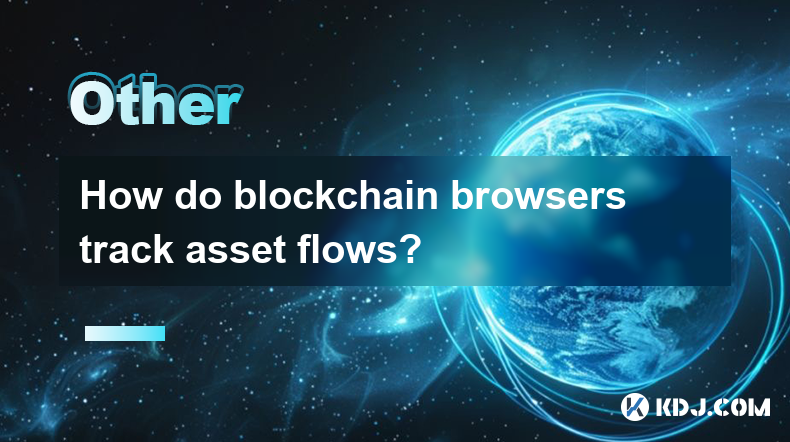
How do blockchain browsers track asset flows?
Mar 30,2025 at 02:35pm
Understanding Blockchain Exploration and Asset TrackingBlockchain browsers, unlike traditional web browsers, are specialized tools designed to explore and analyze data on a blockchain network. They don't 'track' assets in the sense of following individual users. Instead, they provide a transparent view of on-chain transactions, allowing users to observ...
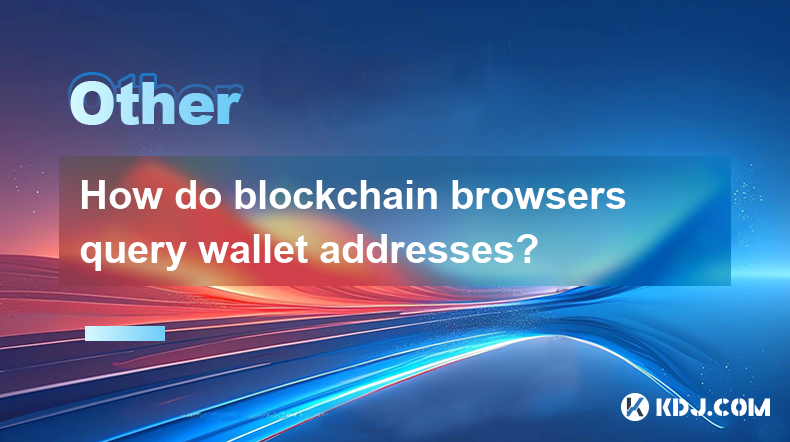
How do blockchain browsers query wallet addresses?
Mar 29,2025 at 05:21pm
Understanding Blockchain Explorers and Wallet Address QueriesBlockchain browsers, often called blockchain explorers, are essential tools for interacting with and investigating blockchain networks. They provide a user-friendly interface to view transaction history, block information, and most importantly, the details associated with specific wallet addr...

The relationship between block browsers and decentralized applications
Mar 30,2025 at 07:35pm
Understanding the InterplayBlock browsers and decentralized applications (dApps) share a symbiotic relationship within the cryptocurrency ecosystem. Block browsers act as crucial tools for interacting with and monitoring the blockchain, while dApps leverage this underlying blockchain infrastructure to provide their functionality. This interplay is esse...

How block browsers ensure data transparency
Mar 30,2025 at 06:49am
Block browsers are designed to provide a transparent view into the inner workings of blockchain networks. Unlike traditional browsers that primarily access centralized servers, block browsers interact directly with the decentralized ledger, offering users a window into the immutable record of transactions. This transparency is a cornerstone of blockcha...

Detailed explanation of the working principle of block browsers
Mar 30,2025 at 03:00pm
Understanding Block Explorer FunctionalityBlock explorers are essential tools within the cryptocurrency ecosystem. They provide a user-friendly interface to view and interact with the underlying blockchain data. This data includes transaction details, block information, and the overall state of the network. Think of them as search engines specifically ...

What are the core functions of block browsers
Mar 30,2025 at 02:50am
? Block explorers, also known as blockchain explorers, are crucial tools for anyone interacting with a cryptocurrency network. They provide a window into the inner workings of the blockchain, offering a wealth of information otherwise inaccessible. Understanding their core functions is key to navigating the cryptocurrency landscape effectively. Explorin...

How do blockchain browsers track asset flows?
Mar 30,2025 at 02:35pm
Understanding Blockchain Exploration and Asset TrackingBlockchain browsers, unlike traditional web browsers, are specialized tools designed to explore and analyze data on a blockchain network. They don't 'track' assets in the sense of following individual users. Instead, they provide a transparent view of on-chain transactions, allowing users to observ...

How do blockchain browsers query wallet addresses?
Mar 29,2025 at 05:21pm
Understanding Blockchain Explorers and Wallet Address QueriesBlockchain browsers, often called blockchain explorers, are essential tools for interacting with and investigating blockchain networks. They provide a user-friendly interface to view transaction history, block information, and most importantly, the details associated with specific wallet addr...
See all articles






















































































